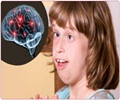The risk of autism may be influenced equally by genetic and environmental factors.

Autism spectrum disorder (ASD) affects almost 1 percent of all children born in the United States and is defined as impairment in social interaction and communication and the presence of restricted interests and repetitive behaviors. Autistic disorder (autism) is the most profound form of ASD, which aggregates in families (increased risk among members of the same family), but the individual risk and to what extent this is caused by genetic or environmental factors is uncertain, according to background information in the article.
Sven Sandin, M.Sc., of the Karolinska Institutet, Stockholm, Sweden, and colleagues estimated the heritability of ASD and risk among family members and assessed the importance of genetic vs. environmental factors by using data of all births in Sweden between 1982 and 2006 (n = 2,049,973). The researchers determined the relative recurrence risk (RRR), which is the relative risk of autism in a participant with a sibling or cousin who has the diagnosis (exposed) compared with the risk in a participant with no diagnosed family member (unexposed).
The study included 14,516 children with ASD, of whom 5,689 (39 percent) had a diagnosis of autistic disorder. The researchers found a 10-fold increased risk of recurrence among siblings of a family member with ASD; cousins had a 2-fold increased risk. This pattern was similar for autistic disorder but of slightly higher magnitude.
Among children born in Sweden, the heritability of ASD was estimated at approximately 50 percent, as was the environmental influence.
"These findings may inform the counseling of families with affected children," the authors write.(doi:10.1001/jama.2014.4144; Available pre-embargo to the media at media.jamanetwork.com)
There will also be an audio author interview available for this study at 3 p.m. CT Saturday, May 3, at JAMA.com.
Diana E. Schendel, Ph.D., of Aarhus University, Aarhus, Denmark, and colleagues write in an accompanying editorial that much remains to be understood regarding familial risk for autism.
"Future studies might consider risks from different combinations of diagnoses in the [family member with ASD] and sibling; for example, the risk of any ASD diagnosis in the sibling of a child diagnosed with autistic disorder, or other combinations of ASD-related or comorbid neurodevelopmental diagnoses (e.g., ASD-epilepsy combinations)."
"In conclusion, the work by Sandin et al supports appreciation of the importance of genetic factors in ASD and adds substantial impetus to the growing attention to environmental influences in ASD etiology."(doi:10.1001/jama.2014.3554)
Editor's Note: All authors have completed and submitted the ICMJE Form for Disclosure of Potential Conflicts of Interest and none were reported.
Source-Eurekalert
 MEDINDIA
MEDINDIA



 Email
Email




